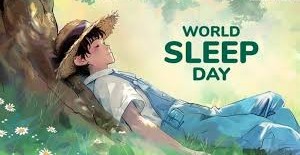I’ve been thinking a lot about sleep since March 14, which was World Sleep Day. That day was also Holi, a festival in India, a boisterous celebration, where people celebrate with colours and music. I was woken up early by loud music from the neighbours’ apartment, which made me grumble about how noisy Bihar (a state in India I was visiting during my spring break) can be. As someone who has trouble sleeping, I’m really interested in sleep, almost like having a crush on it. I want it badly but can’t get it, so I read about it instead.
In Shakespeare’s play Macbeth, the main character can’t sleep because he feels guilty about murdering someone. Shakespeare describes sleep beautifully, saying it’s like a soothing balm for the mind and a necessary part of life.
I think Shakespeare, like me, really loved sleep, which is sometimes called the brother of death.
By the way, thinking of sleep as being related to death is a very comforting idea in stories and poems. It makes death seem less scary because it’s like something we do every day.
Sleep can also be frightening. In Greek stories, the moon goddess Selene loved how a shepherd named Endymion looked when he was sleeping. She made him stay young forever and sleep forever. While he slept, she had 50 daughters with him. It’s a bit strange, but it shows how sleep can be seen as something magical and eternal.
I really like a poem by Keats called “Ode to a Nightingale.” It talks about feeling drowsy and numb, which is how I feel when I can’t sleep. The poem ends with a question about whether the speaker is awake or dreaming, which is something I often wonder too. Don’t think I’m a drug addict because I like these lines. (Keats might have been addicted to his medicine for pain.)
In a story called “Sleep” by Murakami, a person who can’t sleep feels free because she has more time for herself. But like with other Murakami stories, I got bored reading it. The small interesting part at the end wasn’t enough to make up for the boring parts.
The woman in the story talks about her nights when she can’t sleep: “After lying next to my husband for ten minutes, I get out of bed. I go to the living room, turn on the lamp, and pour myself some brandy. I sit on the sofa and read, drinking the brandy slowly. Sometimes I eat a biscuit or some chocolate that I keep in the cupboard. Later, it’s morning. Then I close my book, make coffee, and have a sandwich.” This long description of what she does every night is very boring to me. I don’t care if she eats chocolate with brandy.
For me, the main good thing about Murakami’s books is that they make me sleepy, so I don’t need to take a pill to sleep. After reading ‘Norwegian Wood’ and ‘Kafka on the Shore’, I still think the same. People call him a singer of everyday things, but everyday things don’t have to be boring. I think Murakami is heavy and uses too many words to say simple things.
The deepest thing said about sleep, dreams, and reality is in a children’s book by Leela Majumdar called Halde Pakhir Palak (The Yellow Bird’s Feather). In the book, a child says, “Whenever I wake up, I find that I’m awake!” This simple statement shows how clearly children see the difference between sleeping and being awake, unlike adults who might feel confused about it.
So, sleep is something I think about a lot. It’s comforting, mysterious, and sometimes hard to get. But reading about it helps me feel closer to it, even if I can’t always have it.
Sent by Newsnet Intern JUSTIN MARBANIANG from Tura Meghalaya. Justin is currently in the first year of the Bachelor of Commerce programme in his college. He also likes content writing.



